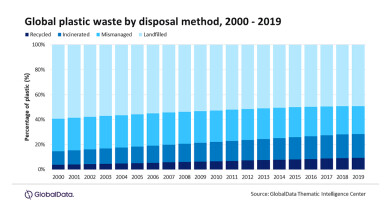Fuel for thought
Oil and gas industry embraces circular economy to combat plastic pollution
Jun 26 2024
The oil and gas industry are increasingly integrating the principles of the circular economy—recycling, reusing, and repurposing products to extend their lifespan—into its operations. Among the industry’s traditional products, plastic stands out as particularly relevant to the circular economy model. The rising demand for circular economy solutions within the oil and gas sector, especially concerning plastics, presents numerous long-term opportunities for companies. By investing in the production of circular polymers, companies can simplify the recycling process for plastics. Additionally, there is significant potential to expand recycling capacities, enabling companies to meet ESG (Environmental, Social, and Governance) objectives by reducing the production of virgin plastics, according to GlobalData, a leading data and analytics firm.
GlobalData’s thematic report, “Circular Economy in Oil and Gas,” underscores the necessity of adopting circular economy practices in the oil and gas industry to tackle plastic pollution. The report highlights the efforts of major industry players like ExxonMobil, Shell, and TotalEnergies in establishing a circular economy for plastic.
Ravindra Puranik, Oil and Gas Analyst at GlobalData, remarks, “The use of plastics has surged in recent decades, exacerbating plastic pollution in terrestrial and aquatic environments. As consumer awareness of the adverse effects of plastic use increases, numerous countries and enterprises are taking steps to address the issue while ensuring economic activities remain unaffected.”
Plastic remains a vital commodity in today’s economy. However, its overuse and poor end-of-life management result in substantial waste and pollution, necessitating efficient recycling of plastic waste. In 2019, less than 10% of the 460 million tons of plastic waste generated was recycled.
Puranik adds, “Several economies are implementing measures to reduce plastic pollution and promote circularity. The European Union has set specific targets to minimise single-use plastic usage within its jurisdiction. Other countries, including Japan and Australia, have also set goals to eliminate plastic waste generation.”
The negative impacts of plastic waste and the non-renewable nature of fossil fuels used in its production have driven sustainability efforts within the plastics sector. These efforts focus on reducing plastic waste sent to landfills, incineration, and mismanagement. Enhancing plastic waste management and recycling can alleviate the demand pressure on virgin plastics entering the market annually.
Puranik concludes, “Companies are exploring viable alternatives to reduce reliance on conventionally produced plastics. The use of bioplastics, produced from alternative feedstocks such as agricultural waste, is an emerging trend in the industry. Leaders like BP, Shell, and TotalEnergies have set targets for plastic recycling. Companies are adopting various approaches, including mechanical recycling, chemical recycling, and bioplastic production, to support their ESG commitments.”
Digital Edition
PIN 26.1 Feb/Mar 2025
March 2025
Analytical Instrumentation - Elemental Analysis for Quality and Process Control at Refineries, for Lubricants and Wear Metals in Engine Oils - Synthetic Lubricants: New Developments - Scaling...
View all digital editions
Events
Apr 22 2025 Hammamet, Tunisia
Apr 22 2025 Kintex, South Korea
Solar & Energy Storage Summit 2025
Apr 23 2025 Denver, CO, USA
Apr 27 2025 Portland, OR, USA
Apr 29 2025 Mumbai, India



















